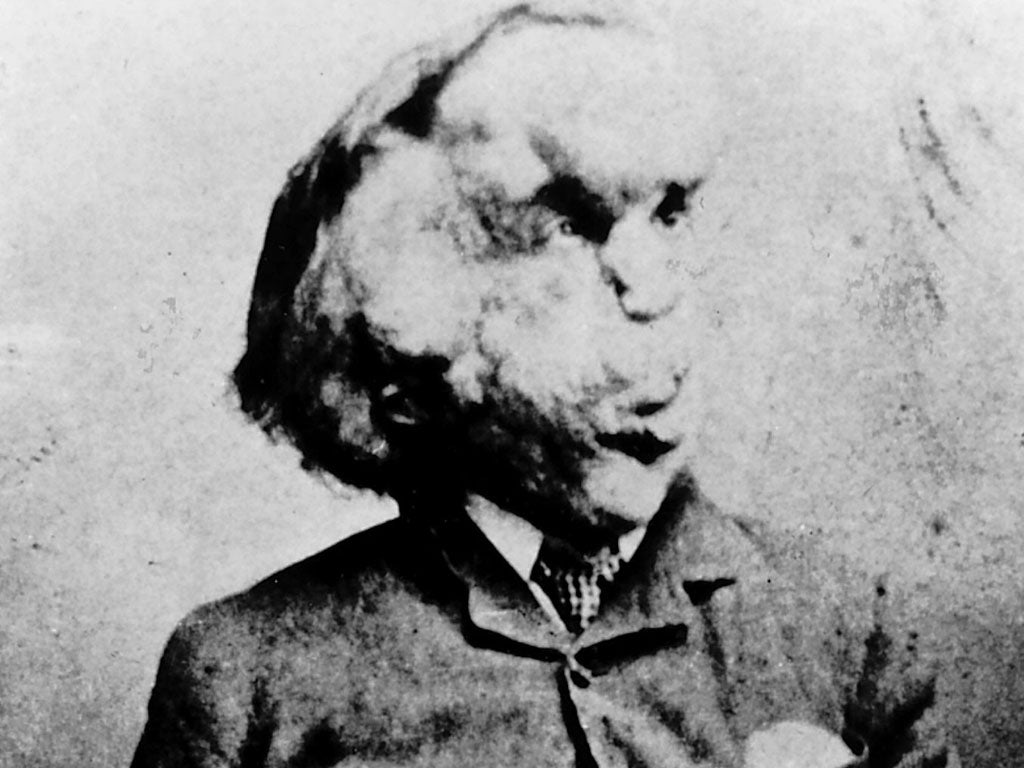Will DNA unlock the Elephant Man's final secret?
Skeleton could hold key to century-old puzzle of what caused Joseph Merrick's terrible disfigurement

Your support helps us to tell the story
From reproductive rights to climate change to Big Tech, The Independent is on the ground when the story is developing. Whether it's investigating the financials of Elon Musk's pro-Trump PAC or producing our latest documentary, 'The A Word', which shines a light on the American women fighting for reproductive rights, we know how important it is to parse out the facts from the messaging.
At such a critical moment in US history, we need reporters on the ground. Your donation allows us to keep sending journalists to speak to both sides of the story.
The Independent is trusted by Americans across the entire political spectrum. And unlike many other quality news outlets, we choose not to lock Americans out of our reporting and analysis with paywalls. We believe quality journalism should be available to everyone, paid for by those who can afford it.
Your support makes all the difference.He was the thing of children's nightmares, outcast by a Victorian society unable to comprehend his grotesque deformities, but was later immortalised in films and plays. Joseph Merrick, better known as the Elephant Man, is one of medical history's enigmas: 122 years after his death, no one knows exactly what caused his extreme disfigurement. But scientists will attempt to solve the puzzle next month by extracting DNA from his bones for analysis.
Merrick came to the attention of the medical profession in the 1880s. Ever since, scientists have struggled to explain the huge growths that caused him to be first shunned and finally celebrated by society – by the end of his life his courage and humility had, at last, been recognised. Merrick became a folk hero for speaking up for others who were similarly afflicted.
It was initially thought that he suffered from Elephantiasis, a parasitic infection characterised by the thickening and enlargement of skin and tissue, hence his nickname.
Then, in 2001, some scientists suggested that Merrick had suffered from a rare disease called Proteus syndrome – a congenital disorder that causes skin overgrowth and abnormal bone development. But other experts questioned the diagnosis, saying that the way his disease manifested was not typical of that condition. It is hoped this latest research will finally prove conclusive.
Scientists will extract DNA from Merrick's skeleton, which has been kept at the Royal London Hospital at Whitechapel, east London, since his death, aged 27, in 1890. Tests will then be carried out to see if it is possible to sequence Merrick's genome thereby identifying any gene alteration. The already complex technique has been made harder by the fact that Merrick's skeleton has been poorly preserved, and years of bleaching to keep it clean have degraded the remains.
Researchers hope that, by finally diagnosing his condition, they will be able to treat other sufferers.
Professor Richard Trembath, vice principal and executive dean at Queen Mary, University of London, who is overseeing the research and who holds responsibility for the safe keeping of Merrick's skeleton, said: "This is going to be extremely demanding. We know we can get genetic material out of the bone of Merrick. We now need to know whether we can get sufficient from what we believe to be abnormal bone as well as sufficient from normal bone.
"In doing it, we have an absolute regard to make sure we preserve the skeleton. We can't just mash a whole amount of it up. We have to preserve it for future generations because it's an important historical record."
Merrick was born in Leicester in 1862. Because of his deformities, he was rejected by his father and stepmother and was forced on to the street to earn a living. He wore a cap and hood in an attempt to hide his disfigurement. He finally took a job as a sideshow "freak", exhibited as a curiosity. It wasn't until the surgeon Frederick Treves took him under his wing and brought him to the London Hospital, where he lived out his final years, that he became something of a celebrity – he was even visited by Alexandra, Princess of Wales.
Such is the power of Joseph Merrick's story, that adaptations of it continue to run today. The American actor Bradley Cooper is currently starring in a stage adaptation of The Elephant Man, and David Lynch's 1980 film of the same name, where Merrick was played by John Hurt, earned several Oscar nominations. An opera has also been composed that tells the story of Merrick's life.
Join our commenting forum
Join thought-provoking conversations, follow other Independent readers and see their replies
Comments